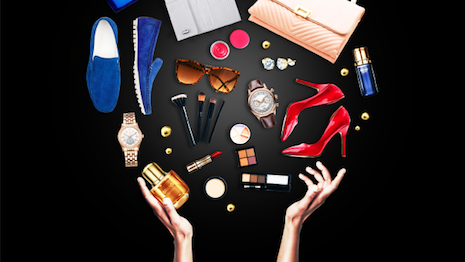 COVID-19 has accelerated the luxury fashion industry into a new age. Image credit: Deloitte
COVID-19 has accelerated the luxury fashion industry into a new age. Image credit: Deloitte Luxury brands are reinventing and reimagining themselves in new ways, as values-driven consumers control the market and sustainability becomes the leading principle of business.
Especially in the COVID-19 era, luxury goods companies are seeking new and meaningful ways to connect with their customers. According to Deloitte’s Global Powers of Luxury Goods 2020 report, digitization is opening up new growth avenues while building sustainability and maintaining a circular economy will be key for luxury brands to thrive amid this rapidly evolving landscape.
The companies considered for inclusion in the Top 100 rankings range from traditional ultra-luxury to super premium to affordable luxury. Based on the financial year 2019 reporting, each company has been assessed on whether the majority of its sales were derived from luxury goods products in the four main categories: designer clothing and footwear; bags and accessories; fine jewelry and watches; prestige cosmetics and fragrances.
For this comprehensive report, the principal sources of financial and other company information were annual reports, SEC filings, information from press releases and fact sheets provided by the companies themselves. If company-provided information was not available, other sources from the public domain were used, such as trade journal estimates, industry analyst reports, business information databases and press interviews.
New standard of luxury
Sustainability will play a key role as fashion and luxury goods companies look for recovery after the pandemic. Global luxury brands have been investing significantly in eco-friendly technologies and other measures such as carbon neutrality to fight against climate change.
While these efforts are certainly not limited to changes in supply chains, brands must begin embracing the changing values and demands of conscious consumers.
Millennials and Generation Z, who are expected to account for approximately half of all global personal luxury goods sales by 2025, have already adopted social and environmental issues as fundamental and essential principles in their purchasing behavior. They are outlining new rules of the luxury market and brands are recognizing that sustainability is the ultimate goal.
 Brands have launched augmented reality shopping tools to bring the experience of in-store shopping to their consumers at home. Image credit: Deloitte
Brands have launched augmented reality shopping tools to bring the experience of in-store shopping to their consumers at home. Image credit: Deloitte
The pandemic has significantly accelerated the shift to analyzing consumer data through artificial intelligence and augmented reality technologies. While digital retail is not expected to completely replace physical stores, brands will benefit from adopting new omni-channel strategies.
Even before the pandemic, many brands were becoming more comfortable selling their luxury products online, as proven by the increased number of online transactions in 2019. Now, brands are able to use digital channels to amplify their visions, convey messages and develop authentic connections with their customers all while adhering to pandemic safety regulations.
For instance, Burberry, in partnership with Google, launched an AR shopping tool that allows customers to experience and buy the brand’s products in its virtual shop (see story).
 The clothing and footwear sector continues to account for the highest number of companies in the Top 100, according to the report. Image credit: Deloitte
The clothing and footwear sector continues to account for the highest number of companies in the Top 100, according to the report. Image credit: Deloitte
The world’s Top 100 luxury goods companies generated revenues of $281 billion in fiscal year 2019, up from $266 billion in the previous year. While the Top 100 luxury goods companies based in China, Japan and the U.S. saw their year-over-year rate of sales growth drop sharply in FY2019, companies based in Europe saw an increase in their growth rate.
While Italy has the greatest number of luxury goods companies, France is the highest performing country with 15.7 percent composite sales growth, contributing 28.3 percent the largest share to the total sales of Top 100 luxury goods companies.
Annual growth jumped to 8.5 percent on a currency-adjusted composite basis, lower than previous year’s 9.6 percent.
There were 12 “high performer” companies in the Top 100 that reported both double-digit year-on-year sales growth and a double-digit net profit margin. For the first time, in FY2019 the Top 10 luxury companies contributed more than half of the total luxury goods sales of the Top 100 companies.
The top-performing sector in FY2019 was multiple luxury goods — companies such as LVMH and Kering with substantial sales in more than one of the luxury goods product sectors — with 12.8 percent sales growth and contributed more than one-third of the total Top 100 luxury goods sales.
The clothing and footwear sector continues to account for the highest number of companies in the Top 100, but they have the smallest average company size of just $1.2B.
Major shift in values
Consumers are becoming increasingly conscious of their purchase behavior, seeking brands that prove environmental and social responsibility.
According to Wunderman Thompson data, 90 percent of consumers in the United States and United Kingdom believe that brands have a responsibility to take care of the planet and its people. Consumers expect brands to be sustainable and transparent to the core, not just in their communication — therefore ethics has become a priority in brand strategy and structure (see story).
To help businesses navigate a post-pandemic market, Burke Inc. and Seed Strategy identified eight consumer segments that have emerged during the pandemic, categorized based on consumers’ personal characteristics and demographics, psychographics, behaviors and COVID-19 impacts and mindsets.
According to the report, brands should showcase their charitable efforts and demonstrate understanding in their messaging to better connect with consumers (see story).